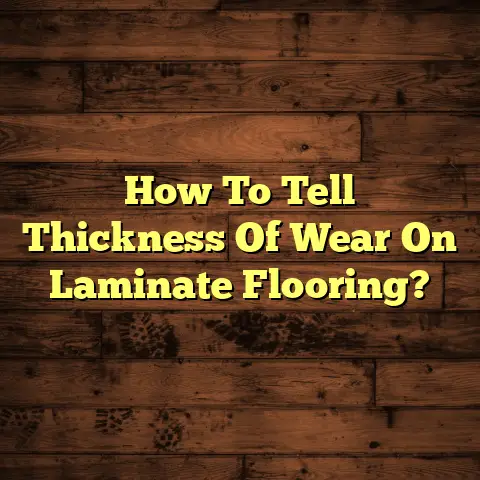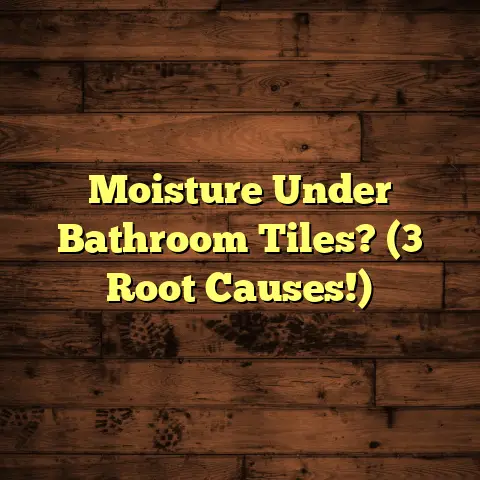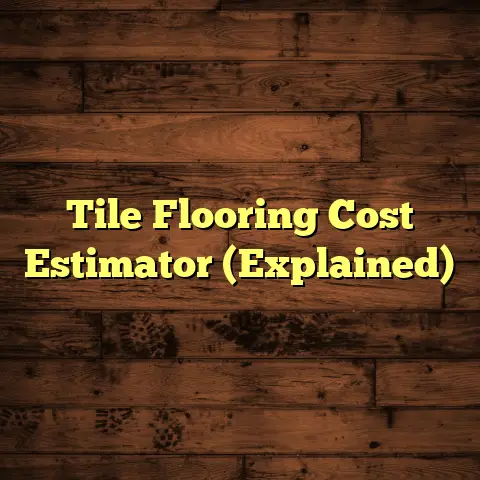Refinishing Hardwood: Cost Calc Canada? (24hr Quote!)
So you’re thinking about refinishing your hardwood floors?
Awesome! It’s one of the best investments you can make in your home.
But let me tell you a story… I once had a client, let’s call her Sarah, who thought she could refinish her living room floor for a steal.
She saw a DIY video, bought some materials, and figured she’d save a ton of money.
Big mistake!
She ended up with uneven sanding, a blotchy stain, and a whole lot of stress.
Plus, she had to call me in to fix it, which cost her way more than if she’d hired a pro in the first place.
That’s why understanding the true cost of hardwood refinishing in Canada is so important.
Let’s dive in, shall we?
Section 1: Understanding Hardwood
Flooring Refinishing
So, what exactly is hardwood refinishing?
It’s basically giving your old, tired floors a makeover.
The process involves:
-
Sanding: Removing the old finish
and any imperfections. -
Staining (optional): Changing the
color of the wood. -
Sealing: Applying a protective
layer to keep your floors looking
great for years to come.
Why bother refinishing?
Well, for starters, it makes your home look amazing.
It can completely transform a room.
Plus, it adds serious value to your property.
According to a recent study by
Remodeling Magazine’s Cost vs.
Value
Report, refinishing hardwood floors can
give you a return on investment of up to
100% in some markets!
[Remodeling Magazine Cost vs.
Value Report]
Section 2: Factors Influencing the Cost
of Refinishing Hardwood Floors
Alright, let’s get down to the nitty-gritty: the cost.
Now, I can’t give you an exact number without seeing your floors, but I can break down the factors that influence the price.
Think of it like this: it’s not just about the square footage.
It’s like baking a cake – you need to consider all the ingredients!
Here’s what we need to consider:
Type of Wood
Believe it or not, the type of wood affects the cost.
Softer woods like pine are easier to sand but might require more coats of sealant.
Harder woods like oak, maple, or cherry take more effort to sand, increasing labor costs.
Exotic hardwoods can be pricier to refinish due to their unique properties and the specialized techniques required.
Condition of the Floor
Is your floor in rough shape?
Lots of deep scratches, dents, or water damage?
That’s going to add to the cost.
We might need to do some repairs before we can even start sanding.
Replacing damaged boards, filling in gouges – it all takes time and materials.
Square Footage
This one’s pretty obvious.
The bigger the area, the more it’s going to cost.
More square footage means more sanding, more staining, and more sealing.
It’s a direct relationship, really.
Location
Where you live in Canada makes a big difference.
Labor costs vary widely from province to province, and even from city to city.
For example, refinishing in Toronto or Vancouver is generally more expensive than in smaller towns.
Rural areas might have lower labor costs, but the overall price could be higher due to travel expenses for the contractor.
Labor Costs
Speaking of labor, what are contractors charging these days?
Well, it depends on their experience, their overhead, and the demand in your area.
On average, you can expect to pay between $40 to $70 per hour for a skilled flooring contractor in Canada.
Keep in mind that some contractors charge by the hour, while others charge by the square foot.
Additional Services
Want a custom stain?
Need to move furniture?
Want eco-friendly finishes?
These extras will add to the final bill.
Custom staining requires more time and expertise, while eco-friendly finishes often cost more than traditional ones.
Section 3: Cost Breakdown
Okay, let’s get specific.
I’m going to give you some ballpark figures to give you a better idea of what to expect.
Remember, these are just estimates.
The only way to get an accurate price is to get a quote from a professional.
Average Costs Per Square Foot
In Canada, you can generally expect to pay between $3 to $8 per square foot to refinish hardwood floors.
This includes sanding, staining (if desired), and sealing.
However, this price can vary depending on the factors I mentioned earlier.
Estimated Costs for Different Types of
Hardwood
Here’s a rough breakdown:
-
Oak: $3 – $6 per square foot.
-
Maple: $4 – $7 per square foot.
-
Cherry: $5 – $8 per square foot.
These are just averages.
The actual cost will depend on the
condition of your floors and the specific
services you need.
DIY vs. Hiring Professionals
Can you save money by doing it yourself?
Maybe.
But there are hidden costs to consider.
First, you’ll need to buy or rent the equipment.
Sanders, edgers, buffers – they’re not cheap.
Second, you’ll need to buy the materials: sandpaper, stain, sealant.
Third, you’ll need to invest your time.
Refinishing floors is hard work, and it takes time to do it right.
And finally, there’s the risk of making mistakes.
Like Sarah, you could end up with uneven sanding, a blotchy stain, or a damaged floor.
If that happens, you’ll have to pay a professional to fix it, which could cost you even more than if you’d hired them in the first place.
In my experience, DIY refinishing is only worth it if you’re very experienced and confident in your abilities.
Otherwise, it’s usually better to hire a professional.
Section 4: Obtaining Quotes
Ready to get some quotes?
Here’s how to do it right:
What to Include When Requesting a Quote
Be as specific as possible.
Tell the contractor:
-
The size of the area you want to refinish.
-
The type of wood you have.
-
The condition of your floors (scratches,
dents, water damage). -
What kind of finish you want (stain, sealant).
-
Any additional services you need (furniture
moving, repairs).
The more information you provide, the more accurate the quote will be.
The Importance of Getting Multiple Quotes
Don’t just get one quote.
Get at least three.
This will give you a good idea of the going rate in your area.
It will also allow you to compare the services and expertise of different contractors.
Tips for Assessing Quotes
Don’t just look at the bottom line.
Read the fine print.
Make sure the quote includes all the services you need.
Ask about the type of materials they use.
Check their references.
And make sure they’re licensed and insured.
A good quote should be transparent and easy to understand.
If something seems too good to be true, it probably is.
Section 5: The 24-Hour Quote Concept
These days, everyone wants things fast.
That’s why some contractors offer 24-hour quotes.
Advantages of Quick Quotes
For homeowners, a quick quote is a huge advantage.
It allows you to make decisions quickly and move forward with your project.
Potential Drawbacks
But be careful.
A 24-hour quote might not be as accurate as a quote that’s based on a thorough inspection.
The contractor might not have had time to assess the condition of your floors properly, or to consider all the factors that could affect the cost.
Ensuring Accuracy
To ensure accuracy, provide as much information as possible when requesting the quote.
Send photos of your floors, describe any damage, and be clear about your expectations.
And don’t be afraid to ask questions.
A reputable contractor will be happy to answer your questions and explain their process.
Section 6: Case Studies
Let’s look at some real-world examples.
Case Study 1: The Condo in Toronto
A homeowner in Toronto wanted to refinish the hardwood floors in her condo.
The area was about 600 square feet, and the floors were in decent condition.
She got three quotes:
- Quote 1: $3,000
- Quote 2: $3,600
- Quote 3: $4,200
She chose the second quote because it was mid-range and the contractor had good reviews.
The final cost was $3,600, as quoted.
Case Study 2: The House in Vancouver
A family in Vancouver wanted to refinish the hardwood floors in their living room and dining room.
The area was about 800 square feet, and the floors were in bad shape.
There were lots of scratches, dents, and some water damage.
They got three quotes:
- Quote 1: $4,000
- Quote 2: $5,000
- Quote 3: $6,000
They chose the third quote because the contractor had the most experience with repairing damaged floors.
The final cost was $6,500 because they had to replace some damaged boards.
Case Study 3: The Cottage in Muskoka
A couple in Muskoka wanted to refinish the hardwood floors in their cottage.
The area was about 1,000 square feet, and the floors were in good condition.
They wanted to use an eco-friendly finish.
They got three quotes:
- Quote 1: $4,500
- Quote 2: $5,000
- Quote 3: $5,500
They chose the second quote because it was mid-range and the contractor had experience with eco-friendly finishes.
The final cost was $5,200 because the eco-friendly finish was slightly more expensive than they had anticipated.
Section 7: Conclusion
Refinishing hardwood floors is a great way to improve the look and value of your home.
But it’s important to understand the costs involved before you start.
Remember the factors that influence the price:
- Type of wood
- Condition of the floor
- Square footage
- Location
- Labor costs
- Additional services
Get multiple quotes, read the fine print, and choose a reputable contractor.
And don’t make the same mistake as Sarah!
Don’t underestimate the costs.
Call to Action
Ready to get started?
Take the first step and research local contractors.
Get some quotes.
Ask questions.
And make an informed decision.
Your dream floors are waiting!





